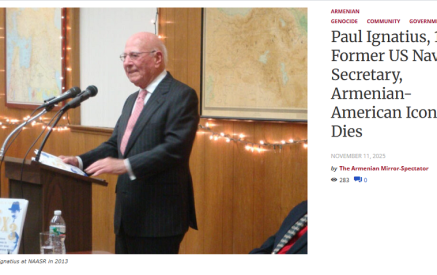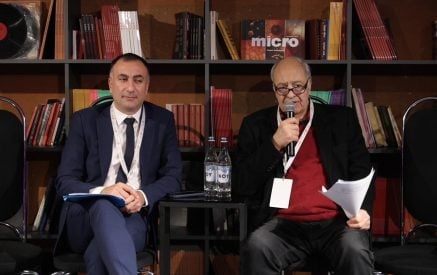By Cristopher Patvakanian
During the summer of 2018, I had the great privilege to complete an internship at the Central Bank of Armenia (CBA) through an internship program offered by my university. As a freshly declared economics major in my sophomore year of college, I thought it would be the perfect opportunity to not only further my experience and knowledge of economics, but also do “something” to give back to Armenia. I of course didn’t doubt how incredible of an experience it would be working among truly Armenia’s brightest and most creative economists at the CBA’s Research and Training Center in Armenia. Quite honestly, how much of a contribution my small research project was during that internship is debatable, but I can say just how profoundly the experience impacted my studies in economics as well as my relationship to Armenia. In particular, one conversation I had with a senior colleague at the bank changed my life and outlook on diaspora relations with the homeland.
The colleague, who typically had much more interactions with the interns in previous years, was incredibly busy during 2018, so I’d say the other interns and I were very lucky to have had the opportunity to speak with him. He invited us to his office to discuss our internship experience and how our projects were going, and gave us the opportunity to debate and ask him “big” questions. The program, which typically has students from all over the world and of all backgrounds, happened to have all but two interns with Armenian ancestry that year. I presume many had the same ambitions as me in finding our way to the CBA – to give something back to our homeland and benefit from the experience.
Read also
During our discussion, the big question I had hoped to ask was “What can we as the diaspora do to help Armenia?” (not that Armenia necessarily needs any diasporans “saving it”). All of us had just witnessed the 2018 revolution, and felt a sense of renewed hope and positivity in the country. Naturally, I was curious to hear, from an economist’s perspective, what is to be done now.
The answer to my question was not what I expected: “You’re asking the wrong question. Don’t come and ask me ‘What can we do?’ Ask yourself, ‘What can you do?’” Immediately, I felt confused. What kind of answer is that? I had expected a response more along the lines of “We need to unite,” “We need to invest,” “We need to be more involved,” etc. – the kind of comfortable answers which frame the “responsibility” collectively on everybody but nobody at the same time. The colleague continued with more uncomfortable truths in response to my question: “Don’t ask what other people are doing or what others should do because you are a part of the diaspora. Ask what are you doing now, or rather, what aren’t you doing now and why?”
The discussion continued with more on taking responsibility and ownership, and putting an end to the endless talking with a start to the actual doing. There was nothing wrong with thinking big, but truthfully speaking, there is much more value to starting somewhere (even small) and actually doing something.
The conversation was a wake-up call. Jokingly, the colleague asked me at the end if I had been convinced to move to Armenia, and I replied, not yet. But I’m certain even an hour more of that discussion might have changed that (not that Armenians should have to be convinced or swayed into repatriating; in my view it should be something they do because they want to do it.) But the big takeaway for me from that conversation was to put an end to the discussions and start the actions. The call for action, if not always present, had a special aura that year.
That summer, I had the great fortune to not only meet the amazing team at the CBA, but also fantastic youth in Armenia through a brief volunteering experience for the Aurora Prize. Though I have gone to Armenia many times, both experiences on the ground at the CBA and Aurora with so many young people my own age were eye-opening. I interacted with a generation of people who had hope, who saw a future in Armenia, and were inspired and excited about the things to come. To say their energy and enthusiasm was infectious would be an understatement. I mentally made my own plans and envisioned a future for myself in Armenia, but at the same, lacked an understanding of what I had to offer yet, if anything.
Flash forward two years. The hope and optimism is seemingly replaced by despair and panic. The COVID-19 pandemic devastated the Armenian people and stretched our country’s already scanty resources to the limit. The tragic war of 2020 took away the lives of so many of that bright generation I had met just two summers ago. It’s a loss almost impossible for me to comprehend.
The chaos, I think, crushed the hopes of many Armenians, both living in the country and in the diaspora. Many diasporans stopped following the situation after the war, stopped their activism and donations, and lost their enthusiasm for the Armenian cause. And for a brief period, that included me. I stopped watching the news, took a break from donating to humanitarian aid, and just needed some “time off.” I think that was an incredibly selfish and self-indulgent but also necessary thing to do. Like many, I was disappointed by the political actors and international institutions, incredibly depressed about the pillage of our people, and traumatized by the frequent videos of war crimes showcased on social media. Taking time to process, think, and work through these very real issues was something I needed. But I didn’t dwell on them for too long, because unlike two years prior, when I could not find the senior colleague’s answer to “What can you do?”, I had already done and been doing my “somethings.”
Prior to graduating, I wrote my senior thesis on Armenian diasporan investment, to not only provide evidence for its existence, but to further the field of diaspora studies and highlight its importance for our country. I intend on publishing the piece and have yet to make it publicly available, but the intention is to motivate a call to action not only from the Diaspora, but also Armenia itself. My other “something” is working with an Armenian data science organization called DataPoint Armenia. As a contributor there, I share my data science and economics background to help further the study of Data Science in Armenia, conduct projects on areas related to the country, and encourage others both in the Armenia and the diaspora to embrace this up-and-coming field. Finding these “somethings” for me to do were certainly not easy or immediate, but occurred through persistence, the great fortune of my Armenian network, and the motivation of logical reasons. And for me, this is just the beginning of many things to come.
Though patriotism and love for Armenia are reasons to start, I think you have a larger and longer lasting impact when there are compelling reasons to be involved, participate, and partner with our homeland. In terms of the diaspora’s involvement as a whole, I think there’s much more to be done right now, and the call to action couldn’t be any clearer than today.
In the 21st century, we fortunately have an unprecedented access to information and people though the internet, social media, and professional networks. In my view, if you’ve figured out what your “talent” is and are in a place to share it, what, how, why, or even if, you choose to do something to help Armenia with your specialty is up to you. But I strongly encourage you to do so. As a diasporan reaching out to other fellow concerned diasporans, I leave you with one final thought. Try not to think “What can we as a Diaspora do?”, but rather “What can I do?”.
(Cristopher Patvakanian is a researcher and data scientist based in Boston, MA. He has studied economics, government, and political-economy, and researched Armenian Diaspora investment for his undergraduate thesis. He has interned at the Central Bank of Armenia and volunteered briefly for the Aurora Prize Humanitarian Initiative. He is also currently a data science contributor with DataPoint Armenia.)


























































